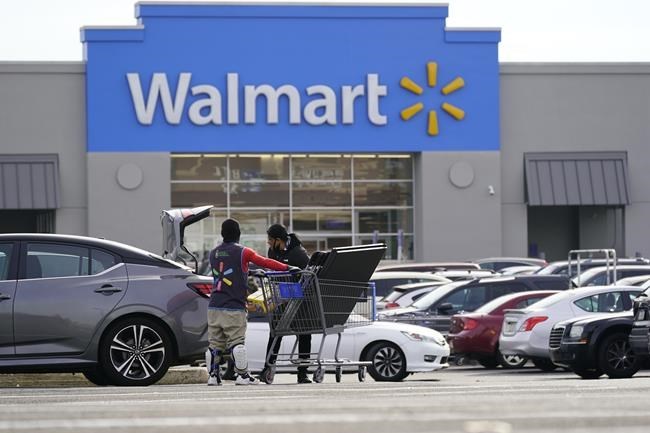NEW YORK (AP) — Walmart reported stronger sales for the first quarter, but its profit took a beating as the nation's largest retailer grappled with surging inflation on food and fuel and higher costs from a snarled global supply chain.
The company also on Tuesday cut its full-year earnings forecast, sending shares down nearly 7% before the opening bell. If that trend holds, it will be the biggest percentage decline in the company's share price in more than two years.
Walmart reported earnings of $2.05 billion, or 74 cents per share. Adjusted earnings per share was $1.30, but that's still far short of the per-share earnings of $1.48 that Wall Street had expected, according to a survey by Zacks Investment Research. It also fell below last year's earnings of $2.73 billion, or 97 cents per share.
Sales rose 2.4% to $141.57, better than the $138.8 billion that analysts had projected.
“Bottom line results were unexpected and reflect the unusual environment, “said CEO Doug McMillon. “U.S. inflation levels, particularly in food and fuel, created more pressure on margin mix and operating costs than we expected."
The government reported last week that inflation eased slightly in April after months of relentless increases. Consumer prices jumped 8.3% last month from a year ago, below the 8.5% surge in March, but it remains very close to a four-decade high.
And there are sobering signs that inflation may be becoming more entrenched. Excluding the volatile food and energy categories, so-called core prices jumped twice as much from March to April as they did the previous month. The increases were fueled by spiking prices for airline tickets, hotel rooms and new cars. Apartment rental costs are also spiking.
Still, Walmart's sales held up. The retailer tends to benefit in an inflationary environment as shoppers typically trade down to lower-price stores.
Sales at stores opened at least a year at Walmart's U.S. division rose 3%, below the fourth quarter pace of 5.6%. and the 9.2% jump in the third quarter. Online sales rose 1% in the fiscal first quarter as growth has slowed from the pandemic-infused sprees of early 2021. That's down from 8% growth in the third quarter.
Walmart, based in Bentonville, Arkansas, is among the first major retailers to report quarterly results and is considered a major barometer of spending given its size and the breadth of its customer base.
Retailers, as Walmart's quarterly numbers show, are facing inflationary pressure with labor and shipping as supply chain backups hitting companies worldwide — and it doesn't look like the situation is getting dramatically better given COVID-19-lockdowns in China. Walmart is particularly sensitive to rising food prices because it's the largest seller in the U.S.
But Walmart has been trying to use its clout to muscle through some of the worst of the supply chain issues by chartering vessels for its goods. As for managing inflation, it said in February it's using years of expertise from monitoring surging prices in other parts of the world like Mexico and parts of South America where it does business.
Those efforts didn't seem to be enough to tame higher costs. Walmart said it now expects earnings for the year to be down 1%; in February, it expected profits to be up in the mid single digits.
_______
AP Economics Writer Chris Rugaber contributed to this report.
Anne D'innocenzio, The Associated Press



